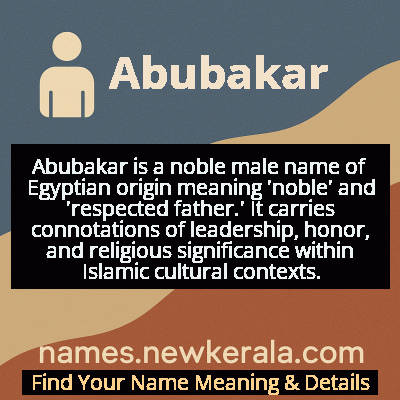Abubakar Name Meaning & Details
Origin, Popularity, Numerology Analysis & Name Meaning of Abubakar
Discover the origin, meaning, and cultural significance of the name ABUBAKAR. Delve into its historical roots and explore the lasting impact it has had on communities and traditions.
Name
Abubakar
Gender
Male
Origin
Egyptian
Lucky Number
3
Meaning of the Name - Abubakar
Abubakar is a noble male name of Egyptian origin meaning 'noble' and 'respected father.' It carries connotations of leadership, honor, and religious significance within Islamic cultural contexts.
Abubakar - Complete Numerology Analysis
Your Numerology Number
Based on Pythagorean Numerology System
Ruling Planet
Jupiter
Positive Nature
Optimistic, inspirational, and creative.
Negative Traits
Scattered, exaggerating.
Lucky Colours
Yellow, gold, purple.
Lucky Days
Thursday.
Lucky Stones
Yellow sapphire.
Harmony Numbers
1, 2, 9.
Best Suited Professions
Arts, writing, communication.
What People Like About You
Creativity, optimism.
Famous People Named Abubakar
Abu Bakr al-Siddiq
First Caliph of Islam
First successor to Prophet Muhammad and one of the earliest converts to Islam
Abubakar Tafawa Balewa
Prime Minister
First Prime Minister of independent Nigeria and prominent African statesman
Abubakar Shekau
Militant leader
Former leader of Boko Haram insurgent group in Nigeria
Abubakar Bukola Saraki
Politician
Former President of the Nigerian Senate and prominent political figure
Name Variations & International Equivalents
Click on blue names to explore their detailed meanings. Gray names with will be available soon.
Cultural & Historical Significance
The name spread across Africa and Asia through Islamic expansion and trade routes, becoming particularly common in North African countries including Egypt, where it symbolizes religious devotion and historical continuity. In modern Egyptian society, Abubakar represents a connection to both Islamic heritage and Arab identity, often chosen by families seeking to honor religious traditions while maintaining cultural roots. The name's enduring popularity reflects its deep integration into the social and religious fabric of Egyptian Muslim communities.
Extended Personality Analysis
Individuals named Abubakar are often perceived as possessing strong leadership qualities, wisdom, and a natural authority that commands respect. They tend to be principled, reliable, and deeply committed to their beliefs and responsibilities, reflecting the noble characteristics associated with the name's historical namesake. These individuals typically demonstrate excellent judgment in difficult situations and are known for their ability to remain calm and decisive under pressure.
Socially, Abubakars are often seen as trustworthy confidants and mediators, possessing the diplomatic skills necessary to resolve conflicts and build consensus. They usually value family and community highly, taking their roles as providers and protectors seriously. While they can be traditional in their outlook, they also show adaptability when circumstances require change. Their combination of spiritual depth and practical wisdom makes them natural leaders in both religious and secular contexts, often serving as pillars of their communities.
Modern Usage & Popularity
In contemporary times, Abubakar remains a popular name throughout the Muslim world, particularly in Egypt and other North African countries where it maintains strong religious and cultural significance. While its usage has remained relatively stable in traditional Muslim communities, the name has seen some adaptation in Western countries where Muslim populations have grown, often being shortened to 'Bakar' or 'Abu' for convenience. In Egypt specifically, the name continues to be a common choice for boys, reflecting both religious devotion and cultural pride, though modern parents sometimes pair it with more contemporary middle names. The name's popularity has shown resilience against changing naming trends, maintaining its status as a classic Islamic name that bridges tradition and modernity.
Symbolic & Spiritual Meanings
Symbolically, Abubakar represents the ideals of righteous leadership, unwavering faith, and moral integrity. The name carries connotations of being a 'first among equals,' reflecting the historical role of Abu Bakr as the first Caliph who successfully guided the Muslim community after Prophet Muhammad's death. It symbolizes the bridge between divine revelation and human leadership, embodying the concept of stewardship and responsible authority. Metaphorically, the name suggests someone who provides protection and guidance, much like a father protects his family, while also representing the continuity of tradition and the preservation of sacred values across generations. In many cultures, bearing this name implies an expectation of living up to high ethical standards and serving as a positive example to others.

